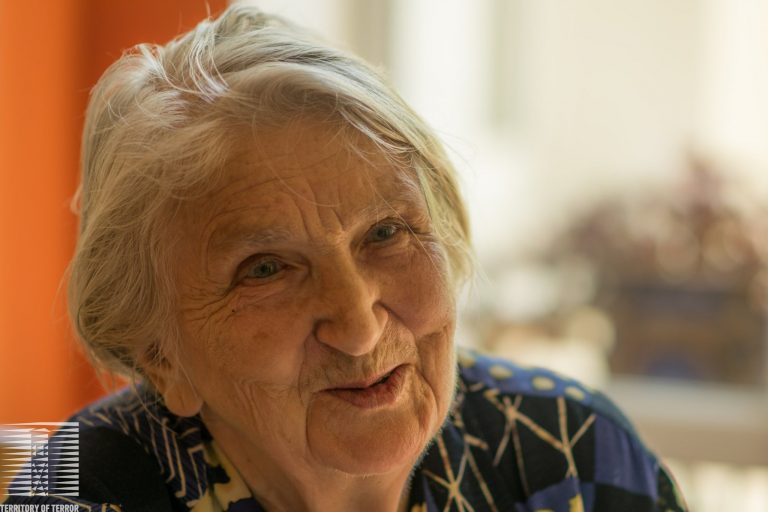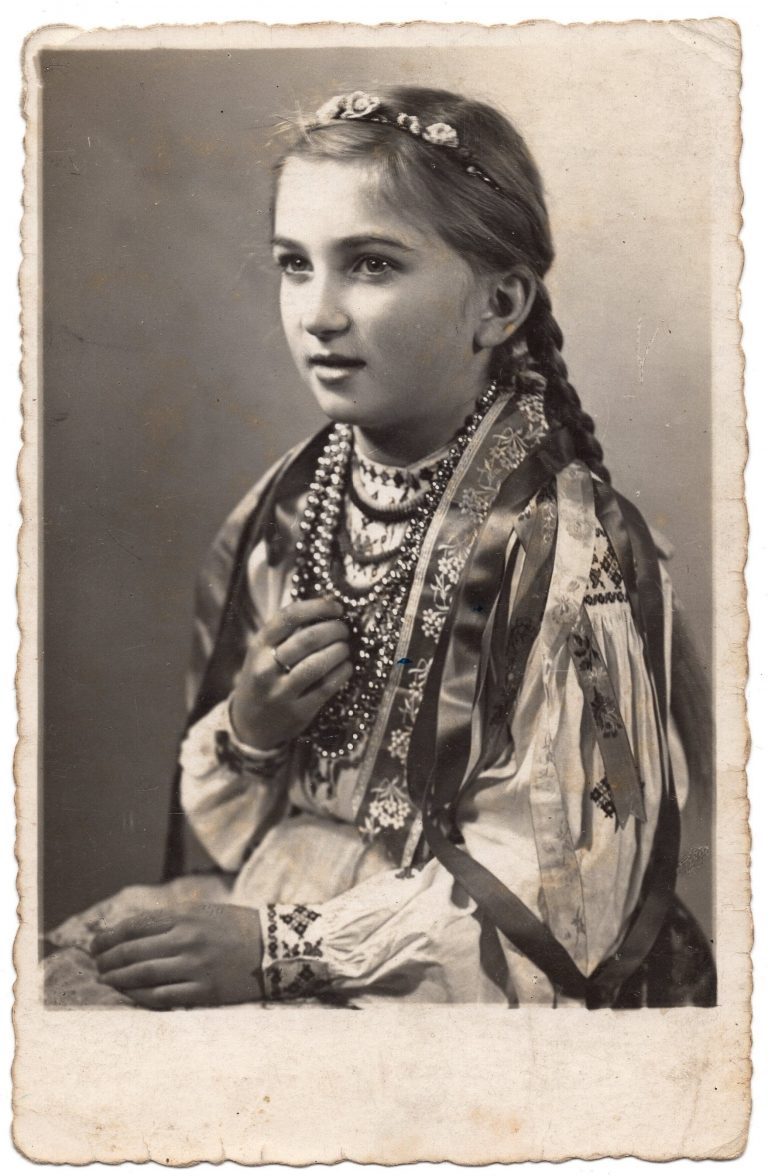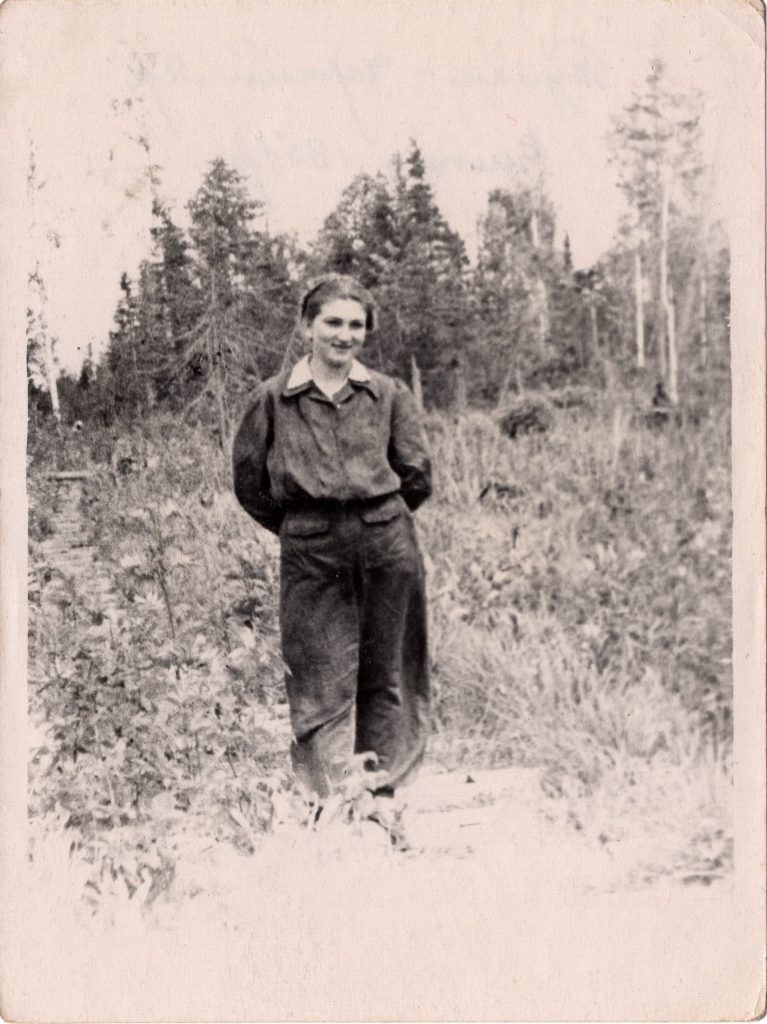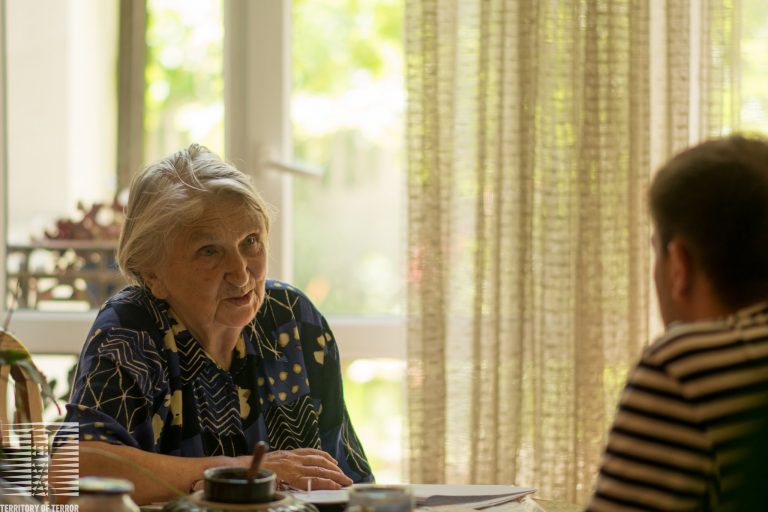Areta Blavatska

Born in 1933 in Truskavets. The family moved to Lviv in 1939. According to Areta, she doesn’t remember much about her parents. Her mother’s name was Kateryna. Her father was a director of Lviv Opera Theatre, and worked as a guard at the Forestry Institute before he retired. There was an elder daughter in the family, Romana.
When Areta was a little girl, she was taken in by a priest’s family in Vilkhivtsi village, Ternopil oblast. She spent two years there. She doesn’t remember the reason, but says there was famine in Lviv at that time.
n spring 1939 official celebrations took place in Lviv Opera and Ballet Theatre to mark the “reunification of Western Ukraine with the Ukrainian Soviet Socialist Republic”. It’s where Areta Blavatska’s father met Mykyta Khrushchov, the then-first secretary of the Central Committee of the Communist Party(b). The men talked about the prospects of communism building. This meeting played an important role in the further destiny of the Blavatsky family. For instance, in 1957, after 10 years in exile, Areta’s father wrote to Khrushchov asking for permission to leave the special settlement and return the confiscated house to the family. Soon they indeed received permission to leave, and the confiscated property was returned to the family. It was a rare occasion for a family of deportees.
Areta vividly remembers the beginning of WWII, for it was the day their family almost died. “I remember on 1 September three armed Poles broke into our house. They were wearing military uniforms and carrying assault rifles. They announced that the military court ordered to shoot our entire family. The reason was someone presumably heard shooting coming from our house. I remember it all. They took us all out of the house. My father, my mother, and me, a five-year-old. My older sister wasn’t home. She went to a secondary school in Przemysl. Our little dog Kiki also followed us”. Nobody knows what destiny would await them, but when they were convoyed along Lviv streets, the German aviation started bombarding the city. Having heard the air raid siren, the convoy guards told the Blavatskys to hide in the cellar of a nearby building. However, the father disobeyed the order and the family darted away from there. Soon the Blavatskys were ringing a bell at the main gate of St. George Cathedral. For some time they were hiding in the cathedral underground together with other people.
Areta remembers some moments from the time when German troops came to Lviv in 1942 and established “new order”: “I always took a first-class tram, for there was a removable rubber partition inside a tram. I sat in the part for Germans. I learned some phrases in German: what time is it, what stop is it and some more phrases. I pretended to be German, you see”.
During the German-Soviet war the Blavatskys lived in Tustanovychi near Boryslav where they bought a house. Little Areta remembered the fierce confrontation of Ukrainian partisans and Polish troops from the Home Army: “A Pole wearing a German uniform, it looked like a German uniform, said that my father was a Russian partisan. He wanted to shoot him. In the presence of me and my sister. I still remember this picture, I was old enough then… I vividly remember my father standing in the middle of the room and this man holding a rifle against his temple. Luckily, he saw a golden watch and a ring Roma was wearing. It was her boyfriend’s gift. She was 10 years older than me. So he said: “If you give me those I won’t shoot” (in Polish). Roma instantly gave him the jewellery. He let go. So the father stayed alive”.
In 1947 the Blavatskys were deported to Siberia. They ended in Chornyi Yar settlement, Tomsk region (Russian Soviet Federative Socialist Republic). The family lived hand to mouth at the beginning. They exchanged for food all belongings they brought. Because of being transported in awful conditions Areta’s mother suffered health issues. Starvation and cold in the new place only aggravated her condition and she spent almost a year in a hospital.
Areta and her father went to the woods and picked up mushrooms and berries to survive. During one of these trips they saw a wood grouse wounded by hunters in the forest. Special settlers were forbidden to hunt, but they followed the bird and caught it. Later Areta’s father got into trouble with the special settlement superintendent because of it.
“My mum plucked it…and we ate. I took a feather as a souvenir, for it was beautiful. Just think of it… I took a feather and put it in a book or some place… As a souvenir! A feather! Some time passed since we ate the meat…we forgot about it. Zlobin came in with the militia and they arrested my father… They started saying that we had weapons and shot the bird. My father denied everything. We have already eaten it… They started searching and found the feather – the one I hid. You see, you can’t hide anything. We would have gotten away with it, or maybe not. So father acknowledged it, and they arrested him and took him to a hospital. It happened instantly. And took him to the district. My father spent a week there. They might have found someone… Or it happened some other way… They found out that it was not him who had shot, but someone else. Rumour had it. My father was let go and all was good”.

Later their life started getting back on track. The Blavatskys received a small abandoned hut. They worked to put it in order and make it livable. A neighbour was helping them at the beginning (a deported Volga German). He brought buttermilk and gave them a piglet.
Later the Blavatskys planted a garden, bought a heifer and kept 12 piglets. The heifer calved. The father decided to slaughter the calf for holidays, and got frustrated that he had no son to help him. Then Areta said: “Dad, I’m going to replace a son for you. Let’s go, I’ll hold the calf”.
However, it turned out to be a shocking experience for a teenage girl. “I’m holding, I was holding! I was holding it for an hour… and then… the cow appeared… and this calf broke out, you know… The calf stood up on its feet without its head or with its head. I was so scared I fled. I abandoned my dad and that calf. You know, there are those impulses… I didn’t know it could happen… I let go of that rope… I let go of everything and I ran away. That’s what I did…”.

While living in exile Areta entered school. “When I got to Siberia… I entered the 9th form… I didn’t know fractions. Well, I didn’t know them and I had to study on my own, imagine that. It was very difficult for me in Siberia. And…I was studying on my own. So I graduated…so-so. I copied a composition. My friends were excellent students. They told me everything during breaks. And teachers loved me. Lead teacher used to say: “Where is our Areta?” I was kind or naughty. Up to some mischief all the time”.
However, Areta didn’t manage to get into the school at the first attempt. The school building was far from the place where they lived. Having received the superintendent’s permission to leave the special settlement, Areta went on her own to submit the documents for school. An unpleasant incident took place. Areta believes the principal intended to rape her. “I pushed him and instantly…the door was open…I went flying down those stairs. The school door was open. I stopped somewhere…fled past the yard and along the street…I stopped somewhere near houses. I didn’t return to school anymore. I skipped the entire year”. She said nothing about that at home. She could only go to school in a year, when that principal was dismissed.
Special settlers received the news of Stalin’s death with subdued happiness: “When Stalin died, it was a mess…Everyone…The school assembly was organised. Goodness, I was laughing my head off, but I had to keep a straight face during the line up… (laughs) Not utter a word… Be a good actress. They were observing us, how we behaved, you know. Well… well… We were happy, so happy that Stalin died and there will be amnesty and release. But there was no release. No one was allowed to return home.
Having graduated from school Areta decided to enter Tomsk pharmaceutical school. The girl succeeded during entrance exams, but never turned up for an admission interview: “I got a sufficient score and they accepted me. But I didn’t turn up to an interview. I was so stupid, you can’t imagine. I didn’t know there was an interview. I saw my name on the nominal roll. I thought – well, no biggie, I’ll have a walk around Tomsk and see the city. I went and when I saw a loaf of bread, I ate all of it/ You see. The entire loaf of white bread, for I never had it”.
When Areta didn’t see her name in the students’ nominal roll, she was taken aback. Then an applicant gave her a piece of advice: “There were our boys… And girls. Someone said: Go to a polyclinic or a hospital and get a medical certificate”. That’s what he said. Dropped a hint. I went to a polyclinic, to the gynaecology department…a doctor I didn’t know. I told him about my entrance exam and that I missed the interview, and she gave me a certificate that I was ill, she wrote a diagnosis that I suffered haemorrhage. This certificate also entitled me not to visit physical training classes til the very end of my studies. So this certificate saved me and I was accepted”. Areta Blavatska till this day believes that education (secondary and specialised) that she got in Siberia was of highest quality. “So I graduated with solid background knowledge. I learned more chemistry in technical school than in the institute. Science was up to the level there. I’m telling you, the school was incomparable to Lviv. I could cut corners or cheat in Lviv. This was not the case over there. They were doing their best to teach you at least a bit of maths”.
In her final year of technical school Areta Blavatska decided to go back home and continue her studies in Lviv Medical Institute. Her family already received permission to leave. Nevertheless, the parents didn’t hasten their departure, as they needed to sell their property. So Areta left alone. Lviv medical institute denied her because of her implicit deportee’s mark. So Areta went to Kyiv to apply through the Ministry of Higher Education of the Ukrainian Socialist Republic.
“You know, I encountered a deputy,..He was…I didn’t know him before or anything. He was rather young. But already a deputy minister. I told him, so and so, I’m a deportee, that’s how I talked to him, and they have to accept me in Lviv… but they wouldn’t, as there’s no permission. He… I had my student’s record book to show him. He didn’t even have a look at it. He just signed the admission papers…to be admitted, no questions asked. He gave it to me and I was instantly admitted. In Lviv. So I am a student in Lviv. I’m in Lviv now, you see. I was happy, you know”. However, she studied there for several months only. “The dean summoned me and said that…he couldn’t keep me any longer, for Tomsk wouldn’t let me go. That was another federation”.
That’s why Areta returned to the Tomsk region.

